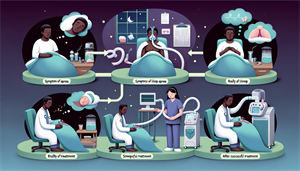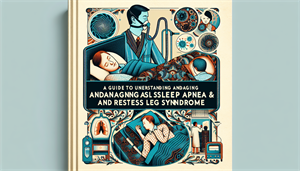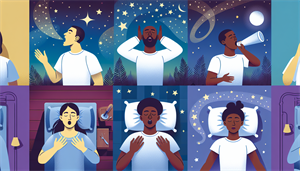
Can Sleep Apnea Go Away?
If you’re grappling with sleep apnea, you’ll be familiar with the disruptive, often alarming breathing pauses that punctuate your sleep. This chronic condition affects millions worldwide, placing them at risk of serious health complications. However, the good news is that although sleep apnea may not be curable, it can be managed effectively with the right treatment and lifestyle modifications, leading many to wonder, “can sleep apnea go away?”
Key Takeaways
Sleep apnea, including obstructive and central types, is a chronic condition, but its severity can be lessened with treatment and lifestyle changes rather than being considered a permanent and static condition. Various treatments, such as CPAP therapy, oral appliances, and surgery, are available and differ in suitability and effectiveness based on individual patient circumstances, with CPAP being generally more effective in reducing apnea events. Lifestyle modifications, including weight loss, quitting smoking, and limiting alcohol intake, significantly improve sleep apnea symptoms and can enhance the effectiveness of medical treatments.
Is Sleep Apnea a Permanent Condition?
Sleep apnea, a condition characterized by repeated interruptions in breathing during sleep, comes in various forms, including obstructive sleep apnea, where the throat muscles intermittently relax and block the airway, and central sleep apnea, which occurs when your brain doesn’t send proper signals to the muscles controlling your breathing. Obstructive sleep apnea occurs in many individuals, but despite being a chronic condition, sleep apnea doesn’t mean a lifelong battle with disrupted sleep and daytime fatigue. Effectively managing this condition’s symptoms is possible with the right treatment and lifestyle adjustments.
Conventional wisdom might lead you to think that to lose weight could cure sleep apnea. Unfortunately, this is not entirely accurate. Although weight loss may not eliminate sleep apnea, it can surely lessen the severity of its associated symptoms. Coupled with other beneficial lifestyle changes like regular exercise, a healthy diet, and the avoidance of alcohol and sedatives like sleeping pills, weight loss can contribute significantly to mitigating the severity of sleep apnea symptoms and its associated risks.
The Reality of Treating Sleep Apnea
Several options are available for treating sleep apnea. Not all treatments are suitable for everyone, and the effectiveness varies depending on the individual’s specific circumstances. The main treatment options include Continuous Positive Airway Pressure (CPAP) therapy, oral appliances, and surgery, each with its own benefits and limitations.
Continuous Positive Airway Pressure (CPAP) Therapy
CPAP therapy is widely used to treat sleep apnea. It helps to keep the airways open during sleep, allowing for easier breathing. It involves wearing a mask over the nose or mouth during sleep, which is connected to a machine delivering a continuous airflow into the nose. This consistent air pressure helps keep the throat open, thereby preventing interruptions in breathing during sleep. Consistent use and appropriate maintenance are key to successful CPAP therapy. It’s crucial to ensure a proper fit for the CPAP mask, as comfort and a good seal are essential for effective therapy. Some individuals may benefit from accessories like comfort pads and heated hoses for an improved CPAP experience. Notably, most private health insurance policies generally cover CPAP machines and associated equipment, making it a feasible treatment option for many. However, the level of coverage may vary depending on the specific insurance plan, making it crucial to check your policy’s details.
Oral Appliances and Their Role
For some individuals, oral appliances may be a more suitable treatment option. These are specialized mouthpiece devices designed to position the jaw and tongue to keep the airway open during sleep. They are custom-fitted by a dentist or orthodontist and are generally well-tolerated. Oral appliances are often recommended for individuals with mild to moderate obstructive sleep apnea or those who cannot tolerate CPAP therapy. They are also used in combination with CPAP for individuals with severe sleep apnea. Regular follow-ups with a healthcare professional are essential to ensure the oral appliance’s effectiveness and to monitor any changes in the patient’s condition.


